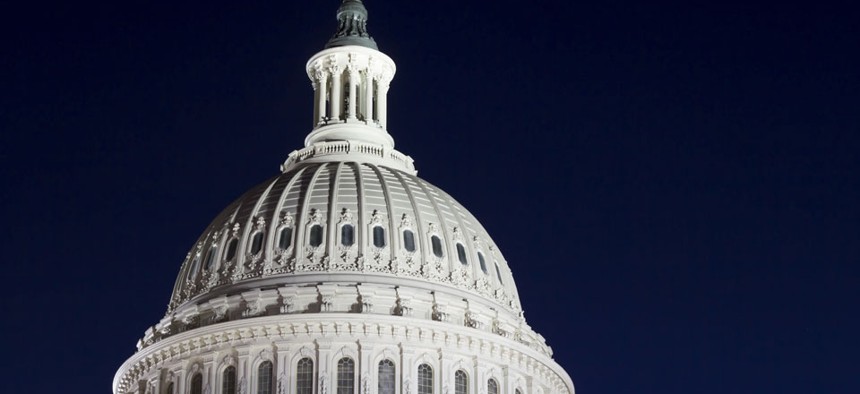
mdgn/Shutterstock.com
House OKs Bill Allowing 1 Percent Pay Raise, Despite Obama Veto Threat
White House objects to cuts to IRS and its own staffers' salaries.
A spending bill that would pave the way for a 1 percent, across-the-board pay raise for federal employees, but would also dramatically slash funding for the Internal Revenue Service and other agencies, cleared the House Wednesday in a mostly party-line vote.
The legislation is far from becoming law, however; even if it passed the Senate -- an unlikely proposition -- the White House has threatened a veto due to its various cuts.
“If the president were presented with H.R. 5016 [the 2015 Financial Services and General Government Appropriations Act], his senior advisors would recommend that he veto the bill,” the White House wrote in a statement of administration policy.
The $21.3 billion bill is silent on the issue of a federal workforce pay raise, clearing the way for President Obama to institute his proposed 1 percent increase. If there is no specific legislative language that provides funds or prohibits an across-the-board raise in any bills -- either stand-alone or omnibus legislation -- the president has the authority to determine a pay raise based on the Employment Cost Index. President Obama in his fiscal 2015 budget recommended the same 1 percent pay boost for federal workers that went into effect in 2014, following a three-year freeze.
Obama’s advisers objected to several provisions of the Financial Services and General Government bill, including the funding of the IRS at $1.5 billion less than requested in the president’s budget. Specifically, White House officials took issue with the blocking of funding for the IRS’ implementation of the 2010 Affordable Care Act.
The National Treasury Employees Union echoed the general funding concerns, noting Congress has cut IRS funding by $1 billion over the last four years, forcing the agency to shed 10,000 employees.
The White House also opposed a provision that hit closer to home: The bill would cap spending on “salaries and expenses” for the Executive Office of the President at $3 million less than the fiscal 2014 enacted level and $7 million less than Obama’s fiscal 2015 request. The legislation would cut funding entirely for the White House’s “unanticipated needs” and certain high-ranking officials.
The bill would also fund the General Services Administration’s Federal Building Fund at $787 million less than Obama’s request. The White House said funding at the House-backed level would eliminate new construction and repair projects, and could force the government to default on rent payments.
The financial services bill for the first time in more than 30 years nearly allowed the U.S. Postal Service to stop delivering mail on Saturdays, but ultimately language requiring six-day delivery was included. Obama’s advisers voiced their disappointment the bill would “prohibit the Postal Service from modifying its delivery schedule to better adapt to its current business environment.”
While the House quietly allowed the federal workforce’s pay raise to move forward, it previously voted to freeze its own pay for the sixth consecutive year. This would be the sixth consecutive year that members of Congress have frozen their own pay.
The House has approved a 1.8 percent pay increase for military service members next year. It is more than Obama’s proposed 1 percent pay raise for military personnel in 2015, and exceeds the 1 percent boost currently in the both Senate Defense authorization and appropriations legislation.
The formula for determining service members’ annual pay increase is based on the Bureau of Labor Statistics’ Employment Cost Index and the growth in private-sector wages. But under the law (Title 37, Chapter 19, Section 1009) the president has the authority to set an alternate pay raise for military personnel, citing a national emergency or fiscal concerns, if Congress doesn’t pass legislation adjusting the amount or canceling it. The 1990 Federal Employees Pay Comparability Act allows the president through executive order to set a pay raise for federal civilian employees under the same circumstances.
Lawmakers in both the House and Senate have introduced bills to give feds a 3.3 percent raise, but those measures have gained little momentum. Federal employee unions supported the larger increase, calling the 1 percent proposal inadequate.
The financial services bill is the seventh spending measure the House has approved; the Senate has yet to approve any.
(Image via mdgn/Shutterstock.com)







